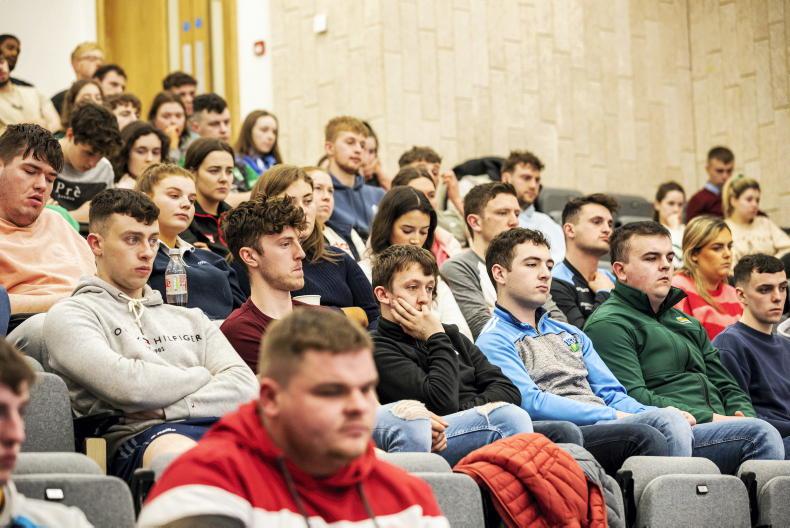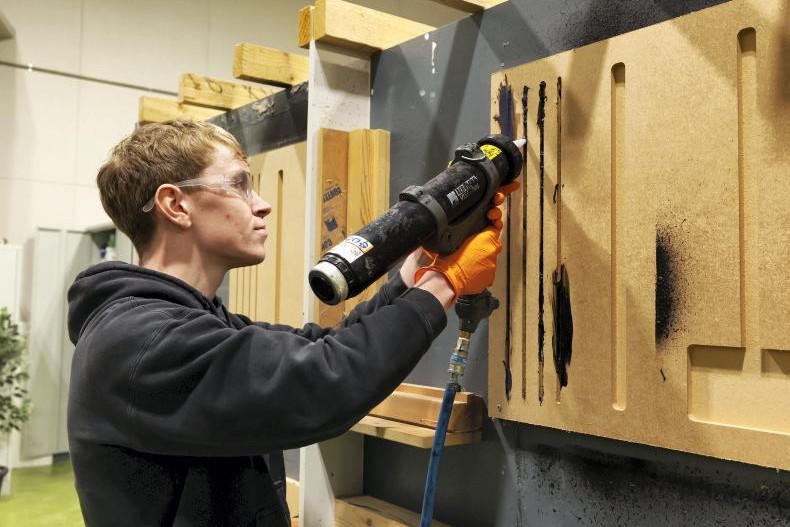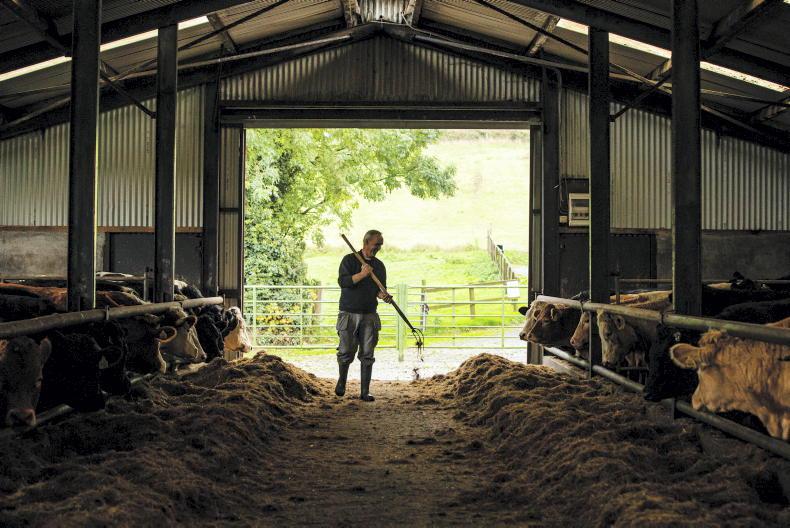The final of the Certified Irish Angus school’s competition took place on Friday, 7 March. Along with the winners of the 2025 programme being announced, 46 groups from across Ireland presented their projects to industry members in the hopes of getting through to the finalist’s stage.
In attendance was Minister for Education and Youth Helen McEntee, who said the projects were hugely beneficial from an educational point of view.
“I think they’re really applying different types of skills and different types of knowledge, and that in itself is hugely beneficial. We’re talking about changes to senior cycle, and a big focus of that is about giving young people different skills.
"This is such a hands-on project. It’s looking at things like animal husbandry, marketing, promotion, climate change and sustainability, so there are so many different avenues for young people to take,” she says.
With regards to the decline in students studying agricultural science for the Leaving Certificate, she believes competitions like this encourage young people to look at the opportunities in the sector.
“We’re highlighting the importance of agriculture – that younger people are at an earlier stage in school, getting access to career guidance, what the options are for them and what these different subjects mean.” she explains.
Minister Helen McEntee says ‘that’s often the biggest challenge’ to show children and young people from an early age what working in agriculture might look like and getting that message across.
“It’s not always necessarily being out on a farm. But it’s all of the other elements of it now as well – it’s promotion, it’s technology in the agri-food and drink sector, it’s massive. Particularly as a country that exports our markets into the US, China and Europe, there are global opportunities at home and abroad. I think we need to be better at promoting that, and this competition is a really good opportunity to do that,” she says.
Promoting beef
According to Charles Smith, general manager of Certified Irish Angus, the programme gives an insight into the challenges of farming, especially for those who are not from a farm.
“I think it helps them to understand that food cannot be something we just take for granted, that it’s always going to be there. There is a huge amount of effort, science and thought that goes into food production.
"When as farmers we try to explain that, it sounds like we’re almost forcing this on people, and yet, when they come here and do their investigation, they start to understand a lot better what the challenges are,” he explains.
The competition covers the whole story of farm to fork.
Five finalists will be selected from the 46 school groups who showcased their ideas last Friday. From there, the students will be given Angus calves which they will care for over 18 months.
Each of the finalists receives the financial benefit involved in the selling of the animals to the processors, which amounts to an average €10,000 per group.
Jack Larkin, Eoin Robinson and Shane King from Mercy Secondary School, Kilbeggan, Co Westmeath were named the winners.
They were selected as finalists at the exhibition two years ago and have been raising their calves since then. The group researched the topic: “Applying Technology to Improve Angus Cattle Breeding” throughout the two-year experience. Read more on page 39 of the Pedigree section.
Irish Country Living also spoke to some transition year groups who were presenting their ideas to industry members. Over the next month, five groups will be selected as finalists, in the hope that they will be winners in two years time.
Eco sea-plastic
Loreto Secondary School, Fermoy,
Co Cork

Clodagh Hayes and Grainne Dinneen from Loreto Secondary School, Fermoy.
Grainne Dineen and Clodagh Hayes are interested in sustainable farming and the environment which resulted in them investigating a solution to plastic packaging.
“We came up with the idea to create a usable seaweed-based packaging for certified Irish beef. At the moment, the packaging that Certified Irish Angus are using is non-biodegradable. We’re very lucky to live in east Cork, surrounded by coastline. We go to the beach often and notice the massive amount of seaweed, which is a natural valuable resource,” says Clodagh.
The students have come up with eco sea-plastic that is biodegradable and will disappear in the soil after three months.
As they are both from farming backgrounds, Grainne and Clodagh are hoping to pursue careers in agriculture, but their school doesn’t offer ag science as a Leaving Certificate subject. The duo are determined that this won’t stop them going on to study it at third level.
Consumer awareness
Our Lady’s Secondary School,
Templemore, Co Tipperary

Michelle Lee, Zara Hennesy, Kate Nevin and Ciara Cahill from Our Lady's Secondary School, Templemore, Co Tipperary.
Students Michelle Lee, Zara Hennesy, Kate Nevin and Ciara Cahill completed their project on increasing consumer awareness around purchasing meat with social medi and podcasts.
“What we are going to try and do is promote beef to people who are buying it and show them what is behind the product. We want to show them how traceable the beef they are eating is and the nutritional benefits of it so they make better purchasing decisions,” says Zara.
The group have gained a lot of skills from participating in the programme, including producing their own podcast.
“At the start, you are nearly worried about what people are going to think, and now we don’t care. We have had a great response on social media. It is a great platform to promote agriculture to younger people,” says Ciara.
Social farming and
accessibility in farming
Ramsgrange Community School,
Co Wexford

Jack Wickham, Emily McCabe, Alannah Byrne and Maggie Byrne from Ramsgrange Community School, Co Wexford.
Inspired by their team member Jack Wickham who is a wheelchair user, Emily McCabe, Alannah Byrne and Maggie Byrne looked at how to make farms more accessible for people and the benefits social farming has.
“Social farming allows people with struggles in life to come to your farm and participate in agriculture, which is a great opportunity for them. We have our teammate Jack, who we brought to the Great Oak Social farm in Co Kilkenny. Jack was able to do most of the activities and get up on the trailer to visit the cows,” says Maggie.
“People need to learn more about accessibility and particularly in farming, as it isn’t always talked about,” says Emily.
The final of the Certified Irish Angus school’s competition took place on Friday, 7 March. Along with the winners of the 2025 programme being announced, 46 groups from across Ireland presented their projects to industry members in the hopes of getting through to the finalist’s stage.
In attendance was Minister for Education and Youth Helen McEntee, who said the projects were hugely beneficial from an educational point of view.
“I think they’re really applying different types of skills and different types of knowledge, and that in itself is hugely beneficial. We’re talking about changes to senior cycle, and a big focus of that is about giving young people different skills.
"This is such a hands-on project. It’s looking at things like animal husbandry, marketing, promotion, climate change and sustainability, so there are so many different avenues for young people to take,” she says.
With regards to the decline in students studying agricultural science for the Leaving Certificate, she believes competitions like this encourage young people to look at the opportunities in the sector.
“We’re highlighting the importance of agriculture – that younger people are at an earlier stage in school, getting access to career guidance, what the options are for them and what these different subjects mean.” she explains.
Minister Helen McEntee says ‘that’s often the biggest challenge’ to show children and young people from an early age what working in agriculture might look like and getting that message across.
“It’s not always necessarily being out on a farm. But it’s all of the other elements of it now as well – it’s promotion, it’s technology in the agri-food and drink sector, it’s massive. Particularly as a country that exports our markets into the US, China and Europe, there are global opportunities at home and abroad. I think we need to be better at promoting that, and this competition is a really good opportunity to do that,” she says.
Promoting beef
According to Charles Smith, general manager of Certified Irish Angus, the programme gives an insight into the challenges of farming, especially for those who are not from a farm.
“I think it helps them to understand that food cannot be something we just take for granted, that it’s always going to be there. There is a huge amount of effort, science and thought that goes into food production.
"When as farmers we try to explain that, it sounds like we’re almost forcing this on people, and yet, when they come here and do their investigation, they start to understand a lot better what the challenges are,” he explains.
The competition covers the whole story of farm to fork.
Five finalists will be selected from the 46 school groups who showcased their ideas last Friday. From there, the students will be given Angus calves which they will care for over 18 months.
Each of the finalists receives the financial benefit involved in the selling of the animals to the processors, which amounts to an average €10,000 per group.
Jack Larkin, Eoin Robinson and Shane King from Mercy Secondary School, Kilbeggan, Co Westmeath were named the winners.
They were selected as finalists at the exhibition two years ago and have been raising their calves since then. The group researched the topic: “Applying Technology to Improve Angus Cattle Breeding” throughout the two-year experience. Read more on page 39 of the Pedigree section.
Irish Country Living also spoke to some transition year groups who were presenting their ideas to industry members. Over the next month, five groups will be selected as finalists, in the hope that they will be winners in two years time.
Eco sea-plastic
Loreto Secondary School, Fermoy,
Co Cork

Clodagh Hayes and Grainne Dinneen from Loreto Secondary School, Fermoy.
Grainne Dineen and Clodagh Hayes are interested in sustainable farming and the environment which resulted in them investigating a solution to plastic packaging.
“We came up with the idea to create a usable seaweed-based packaging for certified Irish beef. At the moment, the packaging that Certified Irish Angus are using is non-biodegradable. We’re very lucky to live in east Cork, surrounded by coastline. We go to the beach often and notice the massive amount of seaweed, which is a natural valuable resource,” says Clodagh.
The students have come up with eco sea-plastic that is biodegradable and will disappear in the soil after three months.
As they are both from farming backgrounds, Grainne and Clodagh are hoping to pursue careers in agriculture, but their school doesn’t offer ag science as a Leaving Certificate subject. The duo are determined that this won’t stop them going on to study it at third level.
Consumer awareness
Our Lady’s Secondary School,
Templemore, Co Tipperary

Michelle Lee, Zara Hennesy, Kate Nevin and Ciara Cahill from Our Lady's Secondary School, Templemore, Co Tipperary.
Students Michelle Lee, Zara Hennesy, Kate Nevin and Ciara Cahill completed their project on increasing consumer awareness around purchasing meat with social medi and podcasts.
“What we are going to try and do is promote beef to people who are buying it and show them what is behind the product. We want to show them how traceable the beef they are eating is and the nutritional benefits of it so they make better purchasing decisions,” says Zara.
The group have gained a lot of skills from participating in the programme, including producing their own podcast.
“At the start, you are nearly worried about what people are going to think, and now we don’t care. We have had a great response on social media. It is a great platform to promote agriculture to younger people,” says Ciara.
Social farming and
accessibility in farming
Ramsgrange Community School,
Co Wexford

Jack Wickham, Emily McCabe, Alannah Byrne and Maggie Byrne from Ramsgrange Community School, Co Wexford.
Inspired by their team member Jack Wickham who is a wheelchair user, Emily McCabe, Alannah Byrne and Maggie Byrne looked at how to make farms more accessible for people and the benefits social farming has.
“Social farming allows people with struggles in life to come to your farm and participate in agriculture, which is a great opportunity for them. We have our teammate Jack, who we brought to the Great Oak Social farm in Co Kilkenny. Jack was able to do most of the activities and get up on the trailer to visit the cows,” says Maggie.
“People need to learn more about accessibility and particularly in farming, as it isn’t always talked about,” says Emily.











SHARING OPTIONS